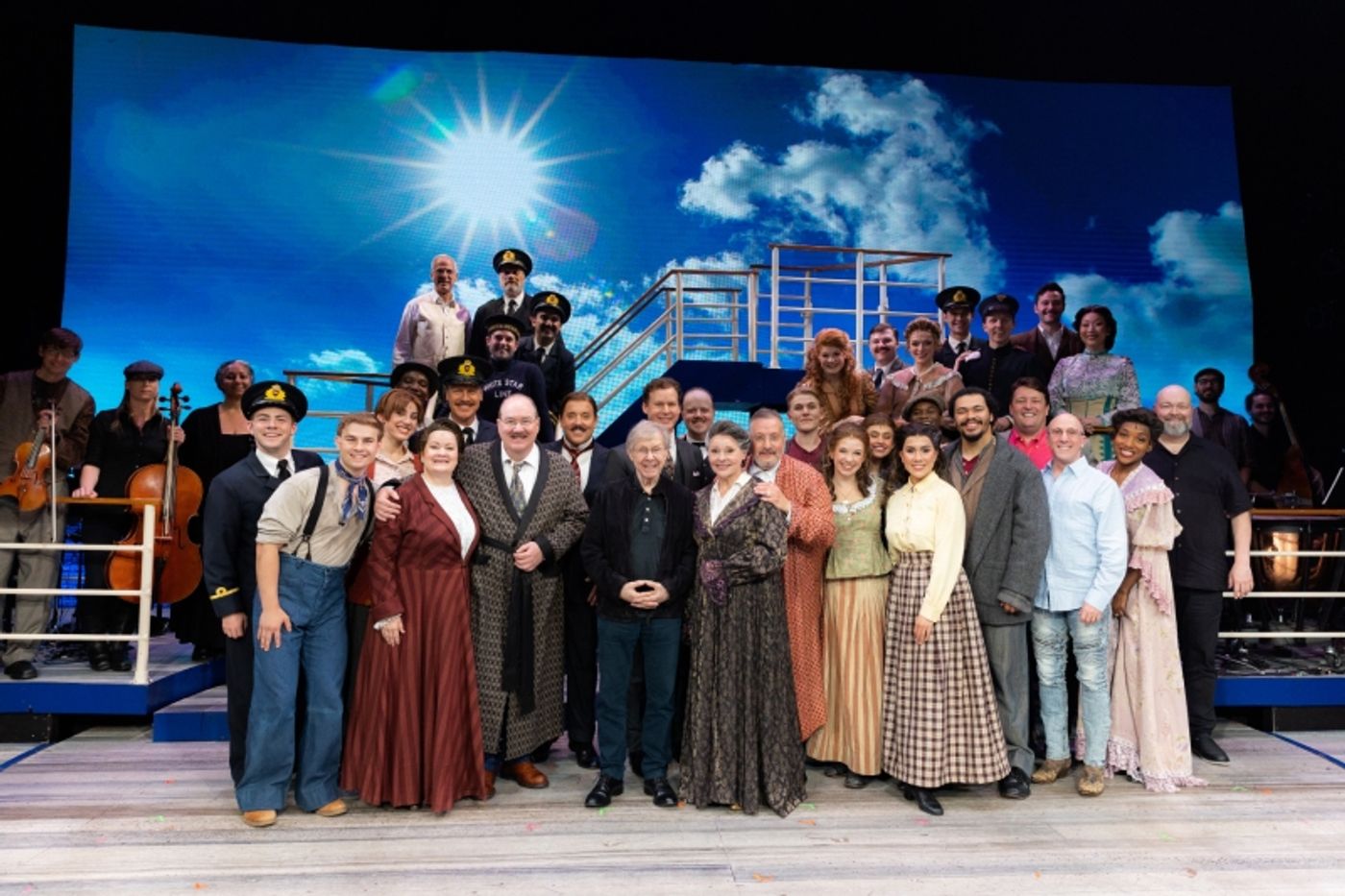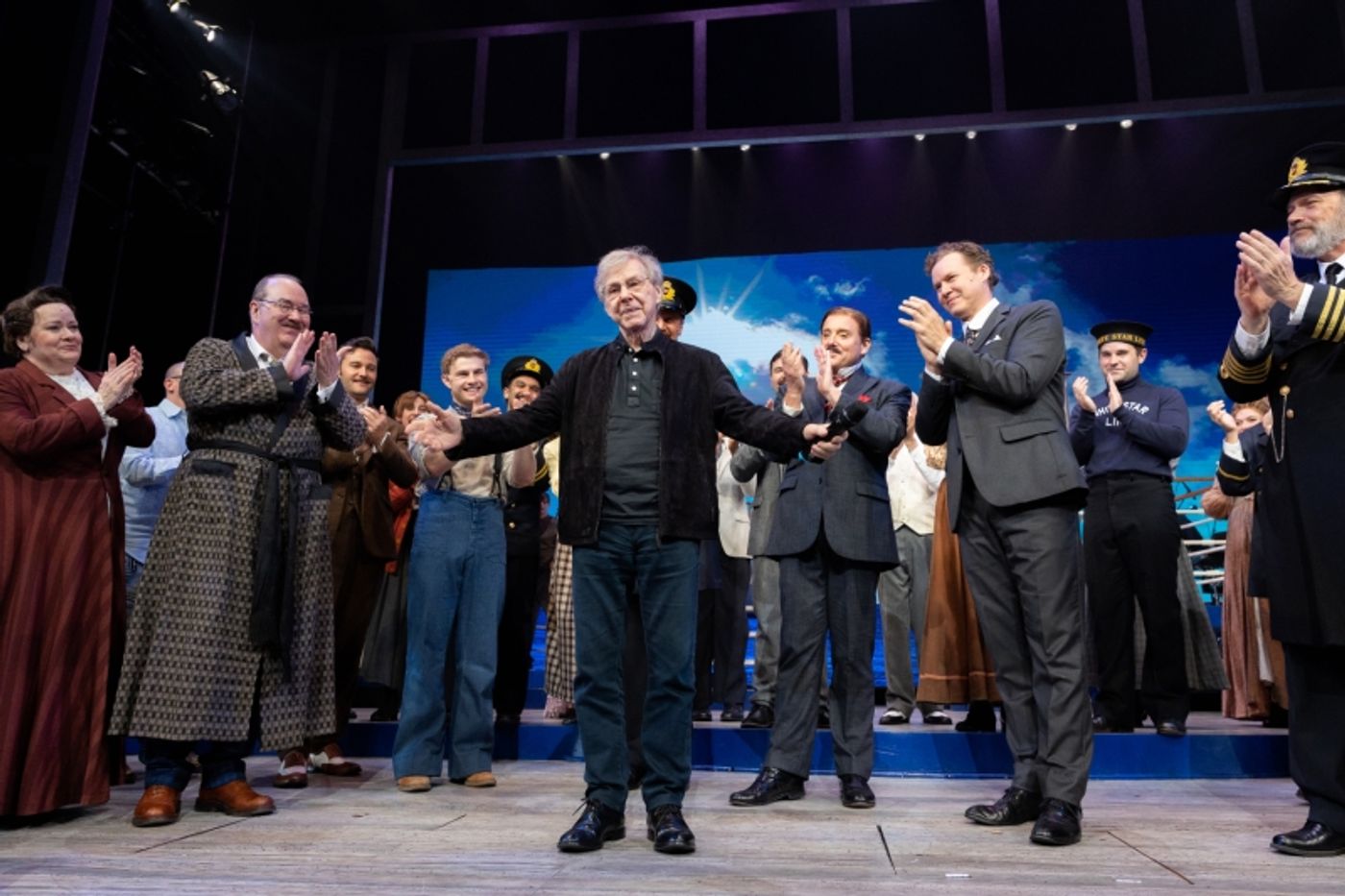Interview: Tony Award Winning TITANIC Creator Lauds MSMT Production as 'Groundbreaking'
Composer and Lyricist Maury Yeston Attends Two Performances of MSMT's TITANIC

On one of its most gala evenings in recent memory, Artistic Director Curt Dale Clark and Maine State Music Theatre celebrated Maury Yeston,Tony/Drama Desk/Olivier Award winning composer and lyricist of TITANIC, with two standing room only performances of the company’s recent revival, directed and choreographed by Marc Robin. And Yeston, who had journeyed to Maine to see his work performed at the Pickard Theater on June 22 and 23, in turn celebrated the work of the company, calling the new co-production, conceived and created by MSMT and the Fulton Theatre, “the most innovative, exciting presentation of anything I have seen in years. It is not even a matter of whether it was my work or any work, what they did here was so original and brilliant in its simplicity that it was magic.”
“I have seen so many iterations of TITANIC, the musical – all of them incredibly worthy, including the Broadway production [1997] which I loved, but what they did here was very, very special. It had to do with the intermingling of all things new - which is what I was trying to do with the score. And the tech was stunning. I had never before seen computer generated visuals integrated into old school tech. It was so completely seamless that it was utterly enchanting – so much so that the show became a new show. Your mouth dropped open every five minutes and you kept saying to yourself, ‘My God, how did they do that?!’ The [visual] transitions among the multiple locations allowed the music to be heard in a different way.”
 Yeston reflects on how, in writing the work, he foresaw the challenges of staging it. “I knew instantly that to present this as a stage show there were two competing things that need to be done. First, you have to portray large groups of people like the first, second, third class passengers, crew, workers down below, owners and bosses up top; at the same time that you depict these general interest groups, there are some nine characters we need to get to know individually. What I had to do in the score was to integrate and balance the group experience with the specific one. The information has to play out slowly enough so the audience doesn’t feel overwhelmed or confused. [Rather] they should feel completely absorbed by the story and let the music wash over them. Because of the way this production was done, the experience just falls into your brain and heart.”
Yeston reflects on how, in writing the work, he foresaw the challenges of staging it. “I knew instantly that to present this as a stage show there were two competing things that need to be done. First, you have to portray large groups of people like the first, second, third class passengers, crew, workers down below, owners and bosses up top; at the same time that you depict these general interest groups, there are some nine characters we need to get to know individually. What I had to do in the score was to integrate and balance the group experience with the specific one. The information has to play out slowly enough so the audience doesn’t feel overwhelmed or confused. [Rather] they should feel completely absorbed by the story and let the music wash over them. Because of the way this production was done, the experience just falls into your brain and heart.”
In order to create the effect to which Yeston is alluding, the composer says that the book by Peter Stone and his [Yeston’s] musical score must take place in multiple locations all over the ship. Yeston marvels at the cinematic seamlessness of Robin’s staging and comments on some of the scenic and directorial elements that help create the desired illusion, like the turntable “which somehow appears connected on either side, yet moves fluidly," or the occasional freezes in action which “allow audience to focus on the group and the specific individuals at the same time. Everything they did,” Yeston observes, “tricked the eye. The entire set [and staging] were like quicksilver. Suddenly, you were someplace else or in a place where two things were going on simultaneously. I have never quite seen that kind of magic – certainly not with this show.[TITANIC].”
Yeston recounts how “TITANIC is generally done with very little scenery and lets the audience imagine location. In this case, the production offered such a brilliant representation of each location in a way that they could move liquidly from one place to another. It was almost as if the set were functioning as music.”
Besides the extraordinary marriage of music and visual effects, Yeston feels this production of TITANIC successfully underscores the human dimension of the work. “Every step of the way, you felt the pure humanity of every individual and every group. There were visual clues in the scenery, in the movement, and the way things happened simultaneously.”
In Yeston’s view, another major factor that deepened the production’s poignancy was the stunning level of performances by the MSMT cast. “I have been incredibly fortunate to have my work performed by wonderful people with brilliant talents,” he says. “In this case, absolutely everyone - especially those playing the major roles – stepped up to the bar. Everyone was in the zone; everybody was on that ship. They gave an exquisite rendering of time and place and tone.” Yeston cites two cast members with whom he has worked previously in a production of his DEATH TAKES A HOLIDAY, Linda Balgord as Ida Straus – whom he praises as “utterly heartbreakingly beautiful” - and Kevin Earley as the ship’s builder Thomas Andrews – who, Yeston says “owned the evening” especially in his heart-rending final scenes as the ship, together with all his dreams, sinks and he, himself, unravels, surrounded by a shattering nightmare vision of the chaos. “But, Yeston notes in praise of the entire cast, “All these people breathed life into the historical figures. They made us understand through the lens of our modern sensibility; they were never self-referential. [Rather] they seemed to actually live the situation.”
 The composer/lyricist also praises the MSMT/Fulton co-production for its adroit use of Ian Weinberger’s orchestrations for six musicians – strings, keyboards, percussion - to respond to the practical needs of the two producing venues, at the same time that the arrangements of TITANIC”s dense, layered, and complex score still convey the epic scale of the work. “Scale is a funny thing in music or theatre,” Yeston opines. “The truth is that the power of music, big or small, has to do with the distance that the orchestra can make between delicatepianissimi and full-out triple fortes. Even though this is a small group of musicians, rhetorically it reads like an explosion. And with twenty-eight people singing, I didn’t miss the grandeur at all.”
The composer/lyricist also praises the MSMT/Fulton co-production for its adroit use of Ian Weinberger’s orchestrations for six musicians – strings, keyboards, percussion - to respond to the practical needs of the two producing venues, at the same time that the arrangements of TITANIC”s dense, layered, and complex score still convey the epic scale of the work. “Scale is a funny thing in music or theatre,” Yeston opines. “The truth is that the power of music, big or small, has to do with the distance that the orchestra can make between delicatepianissimi and full-out triple fortes. Even though this is a small group of musicians, rhetorically it reads like an explosion. And with twenty-eight people singing, I didn’t miss the grandeur at all.”
Asked about the chilling irony of these TITANIC performances playing as word of the tragic loss of the Titan submersible became known, Yeston, who, together with Clark in a post-performance curtain speech, dedicated the June 23 performance to the lost souls and spoke of how TITANIC’s story has always represented a “lesson we have to learn again and again. We strive; we fail. Sometimes we dare too far. We have to applaud the striving and regret the failure. We have to continue to adventure.”
“We dedicate this performance to the memory of those sad souls who lost their lives, tragically on the site of the Titanic,” Yeston told the 600+ Brunswick audience who offered him and the company a record- long series of standing ovations. If many of the audience had tears rolling down their cheeks, the sentiment was not lost on Yeston who confided, “This was the spontaneous, instantaneous kind of applause that tells you the audience is reacting emotionally because they were so moved by the performance.” Yeston, who has enjoyed a long connection with MSMT – the company has produced his works over the years and he serves as an Advisory Board member– applauded the company for “being one of the most continuously and consistently brilliant theatre companies in the United States.”
And now to this long and fruitful collaborative connection, Maury Yeston adds a new sense of marvel and wonder. Of the 2023 TITANIC production, Yeston says. “I was simply astonished. This was a thrilling evening. They [MSMT/Curt Dale Clark and Fulton/Marc Robin] have broken new ground. They made my work better.”
Photographs courtesy of MSMT: Yeston, Robin, and Clark by Dane Whitlock; Yeston and TITANIC cast onstage by Jared Morneau
TITANIC ran at MSMT from June 7-24, 2023 at the Pickard Theater on the Bowdoin College campus, 1 Bath Rd. Brunswick ME and prior to that at the Fulton Theatre in Lancaster, PA from April 20-May 21, 2023
MSMT information at www.msmt.org 207-725-8769
Videos

